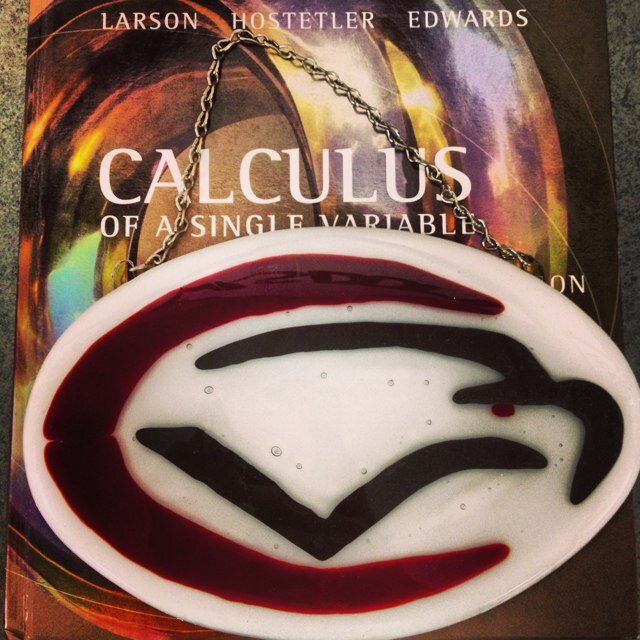
Learn Calculus!
@LearnCalculus
Through this Twitter Feed, you may learn Calculus, the condensed language of the physical world! Now on your mobile device!
Note, when f(x)=f(-x), Int(-a,a)[f(x)dx]=2*Int(0,a)[f(x)dx] and when f(-x)=-f(x), Int(-a,a)[f(x)dx]=0. Always check for even and odd f'ns!
When the integral has definite limits, they must be adjusted by change of variables. Int(a,b)[f(g(u))f'(u)du]=Int(g(a),g(b))[f(x)dx], u=g(x)
Use the technique of change of variables to convince yourself that Int[tan(x)dx]=ln(abs(sec(x)))
Many integrals must be simplified by a change of variables, e.g. Int[f(x)dx] becomes Int[f(g(u))g'(u)du] under the substitution u=g(x).
Additionally, Int[1/(x^2+1)*dx]=tan^-1(x) and Int[1/sqrt(1-x^2)*dx]=sin^-1(x)
Int[sec^2(x)dx]=tan(x), Int[csc^2(x)dx]=-cot(x), Int(sec(x)tan(x)dx]=sec(x) and Int[csc(x)cot(x)dx]=-csc(x).
Using the complex def'n of a sine to convince yourself that Int[sin(x)dx]=-cos(x) and Int[cos(x)dx]=sin(x)
At the heart of calculus is the following integral Int[e^x*dx]=e^x, or in other words e^x is the f'n that satisfies the eq'n df(x)/dx=f(x)!
The integration constant arises in the indefinite integral thanks to the fact that dC/dx=0 but will be mostly neglected here.
Int(x^n)=(x^(n+1))/(n+1)+C, where C is an integration constant and provided n/=-1. In that case, Int(1/x)=ln(abs(n))+C.
It is useful to know derivatives and indefinite integrals of basic functions as follows:
If we let F'=f, then it follows that Int(a,b)[f(x)dx]=F(b)-F(a). Without limits, this becomes Int[f(x)dx]=F(x), the indefinite integral.
For bounding integrals, note if m<=f(x)<=M for a<=x<=b, then m(b-a)<=Int(a,b)[f(x)dx]<=M(b-a)
Also, if f(x)>=g(x) for a<=x<=b, then Int(a,b)[f(x)dx]>=Int(a,b)[g(x)dx]
Another basic yet useful-to-know property of an integral, if f(x)>=0 for a<=x<=b, then Int(a,b)[f(x)dx]>=0
Additionally, Int(a,b)[f(x)dx]+Int(b,c)[f(x)dx]=Int(a,c)[f(x)dx]. It can sometimes be useful to perform the inverse and split integral apart
As an operator, the integral is linear: Int(a,b)[c*f(x)+c*g(x)]dx=c*Int(a,b)[f(x)dx]+c*Int(a,b)[g(x)dx]
The simplest non-zero integral is Int(a,b)[cdx]=c(b-a), where c is a constant.
Using the def'n of a definite integral, convince yourself that Int(a,b)[f(x)dx]=-Int(b,a)[f(x)dx] and Int(a,a)[f(x)dx]=0
United States Trends
- 1. Good Wednesday 26.1K posts
- 2. #wednesdaymotivation 3,812 posts
- 3. Jameis 2,103 posts
- 4. Hump Day 11.5K posts
- 5. #Wednesdayvibe 1,984 posts
- 6. #hazbinhotelseason2 42.8K posts
- 7. PancakeSwap BNB Chain 2,295 posts
- 8. ADOR 63.7K posts
- 9. Happy Hump 7,239 posts
- 10. #ENGLOTxHOWEAWARDS25 648K posts
- 11. Northern Lights 53K posts
- 12. #WednesdayWisdom 22.6K posts
- 13. USDT 111K posts
- 14. Hanni 18.6K posts
- 15. StandX 2,606 posts
- 16. H-1B 48.4K posts
- 17. Jack Schlossberg 2,634 posts
- 18. Antarctica 8,651 posts
- 19. MIND-BLOWING 32.9K posts
- 20. Wike 261K posts
You might like
Something went wrong.
Something went wrong.





















































